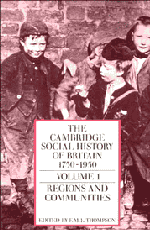5 - The north-west
Published online by Cambridge University Press: 28 March 2008
Summary
Conventional wisdom about the fortunes and significance of this region in the two centuries after 1750 comes trippingly off the tongue. Below a thin crust of banal generalisations, however, the questing historian uncovers shifting, unstable strata of diverging and conflicting accounts and interpretations, often venting as emissions of superheated debate which alarm and confuse the innocent bystander, obscuring the view with steam and volcanic gases and dispelling the illusion of clarity, security and control. Explanations of the social circumstances surrounding the spectacular rise, sustained heyday and precipitous decline of the cotton industry and its associated towns form a staple of historical debate, although the first two phases have received much more attention than the third. The early and intensive interaction of the steam engine, the factory system and an unprecedented rate of urban growth, concentrated within a narrow area of south Lancashire and north Cheshire, proved irresistible to social commentators then and has remained so for social historians ever since. Cotton Lancashire became ‘the first industrial society’ and ‘the cradle of the Industrial Revolution’. The cotton industry became a much debated ‘leading sector’ in British industrialisation, while at the same time its assumed characteristics tended to be misleadingly paraded as a surrogate for the more complex pattern of changes in British economy and society as a whole. The industrialising experience of a small corner of Lancashire and its adjoining counties became at once exciting exception and all-embracing norm in the treatment of Britain's industrial revolution. Moreover, there were political dimensions to the changes.
- Type
- Chapter
- Information
- The Cambridge Social History of Britain, 1750–1950 , pp. 355 - 414Publisher: Cambridge University PressPrint publication year: 1990
References
- 1
- Cited by



